Verbs 动词用法
英语动词的用法归纳总结

英语动词的用法归纳总结动词是英语语法中的一个重要部分,它用于表示一个人、物或事物所做的动作、行为或状态。
下面是几种常见的英语动词用法的总结:1. 及物动词(Transitive verbs):表示动作的动词后面可以接一个宾语,宾语接在动词的后面,它们之间有直接的关系。
例如:I kicked the ball.(我踢了球。
)2. 不及物动词(Intransitive verbs):表示动作的动词后面没有宾语,它们自己就是整个谓语,不需要补充其他成分。
例如:He sleeps.(他睡觉。
)3. 联系动词(Linking verbs):用于连接主语和主语的补足语,对主语进行描述或指示。
常见的连接动词有be(是、在)、seem(似乎)、become(变成)等。
例如:He is a teacher.(他是一名教师。
)4. 助动词(Auxiliary verbs):帮助其他动词构成时态、语态和情态的动词。
常见的助动词有be、do、have等。
例如:Heis studying.(他正在学习。
)5. 情态动词(Modal verbs):用于表示说话人对某个行为或状态的看法、推测、建议、许可等。
常见的情态动词有can、could、may、might等。
例如:I can swim.(我会游泳。
)6. 及物动词+副词(Phrasal verbs):由一个动词和一个副词组成的短语,表示特定的意义。
例如:She turned up the volume.(她调高了音量。
)7. 不及物动词+介词(Prepositional verbs):由一个动词和一个介词组成的短语,表示特定的意义。
例如:He insisted on going.(他坚持要去。
)8. 及物动词+宾补(Transitive verbs with object complements):动词之后有一个宾语和一个宾补,它对宾语进行进一步的描述或说明。
例如:They named the baby John.(他们给宝宝起名叫约翰。
英语 使役动词用法总结

英语使役动词用法总结英语中的使役动词(Causative Verbs)是用来表示某个人或事物被其他人或事物所控制或支配的动词,通常用于表达某件事情被他人或外界因素所促成或导致。
以下是英语中常见的使役动词及其用法:1. Have:表示某人被他人所控制或支配,例如:I had my car repaired yesterday.(昨天我让人修理了我的车。
)2. Get:表示某人被他人所促成或导致,例如:She got her hair cut at the salon.(她在发廊剪了头发。
)3. Make:表示某人被迫或被控制去做某事,例如:He made me finish my homework before dinner.(他让我在晚餐前完成作业。
)4. Let:表示某人被允许或被授权去做某事,例如:They let me use their computer.(他们允许我使用他们的电脑。
)5. Help:表示某人受到他人的帮助或协助,例如:She helped me with my luggage.(她帮我拿行李。
)6. Have someone do something:表示某人被他人所控制或支配去做某事,例如:I had my assistant finish the report.(我让我的助手完成了报告。
)7. Get someone to do something:表示某人被他人所促成或导致去做某事,例如:I got my friend to help me move.(我让我的朋友帮我搬家。
)8. Make someone do something:表示某人被迫或被控制去做某事,例如:My boss made me work overtime.(我老板让我加班。
)9. Let someone do something:表示某人被允许或被授权去做某事,例如:My parents let me stay out late.(我父母让我晚上出去晚些回家。
动词 (Verbs)知识点

动词(Verbs)知识点
‖动词概述‖动词是表示动作或状态的词。
如:
walk ,play,sleep,live, like, know,consist(包含)等。
动词和名词,代词一样,也有人称和数的变化。
谓语动词的人称和数一般必须与主语的人称和数一致。
动词不仅是英语所有词类中最复杂的词,同时也是历年考试中考查最多的。
动词的复杂性表现在多个方面,如有人称和数的变化,有现在式、过去式、过去分词等多种形式,有时态、语态等语法特征。
动词的主要语法特征有:1.时态特殊的动词词尾或有关的助动词,用以表示动作的时间和方面2.语态特殊的动词形式,用于表示动词的主语和宾语之间的关系,即主语是施事者或是受事者3.语气特殊的动词形式,用以表示说话人对所说事物的态度4.体动词本身内含的动作方面,有动态与静态。
静态包括内心活动,各种感觉和感情等。
动态有瞬间,有限,无限,重复等如:When will he arrive? He reached Beijing yesterday.The girls are dancing.He has read the story book.。
英语语法讲解Verbs
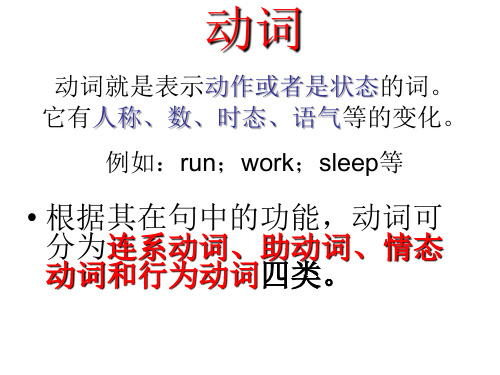
• work ---- working
sleep ----- sleeping
study ----- studying
• 2. 以不发音的-e结尾,要去-e加-ing
• take ----- taking
make ----- making
dance ----- dancing
• 3. 以一个辅音字母结尾的重读闭音节动词,要双写词尾辅音字母,再加-ing
• 4.以辅音字母结尾的重读闭音节,双写最后一个辅音字母再加ed,如stop——stopped
• go • do/does • sit • give • teach • buy
不规则变化
went did sat gave taught bought
动词现在分词形式变化规则
• 1. 一般情况下,直接在动词后加-ing
1)be动词:am is are was were 2)感官动词:look sound smell
taste feel seem 3)转变性动词:get become
②助动词
最常用的助动词有:be, have, has, had, do, does, did
• 1) 助动词自身没有词义,不可单独使用 • 2) 助动词协助主要动词完成以下功用, • a. 表示时态 • He is working. • b. 表示语态 • He was sent to England. • c. 构成疑问句 • Do you like bananas? • d. 与否定词not合用,构成否定句 • I don't like him.
动词有五种形式
• 分别是:原形、第三人称单数、过去式、 现在分词、过去分词。
动词三单形式变化规则
大学英语语法之动词 Verbs

grammatical meaning
a form of verbs indicating the relationship between the Subject and the Predicate
classification
active voice * passive voice:
*
be + p.p. (vt.)
simple sentence
5 basic sentence patterns S. + vi. + … S. + V. + P. * S. + vt. + O. + … * S. + vt. + Oi. + Od. + … * S. + vt. + O. + O.C. + …
transformation
*
*
The boy asked the teacher to explain the sentence.
→The
teacher was asked to explain the sentence by the boy.
We heard them talk about that film. →They were heard to talk about that film. * We heard them talking about ... →They were heard talking about that film.
Usage of aux. v. 1. to form negative V. I don’t like your hat. 2. to form a question Do you like my hat?
verbs的用法:force
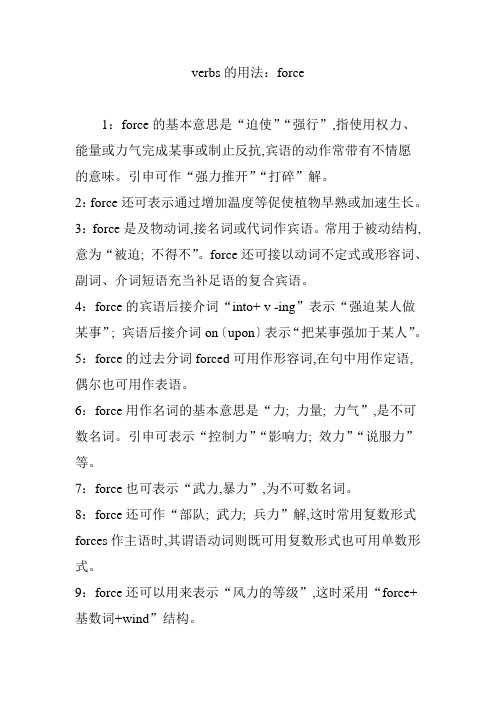
verbs的用法:force1:force的基本意思是“迫使”“强行”,指使用权力、能量或力气完成某事或制止反抗,宾语的动作常带有不情愿的意味。
引申可作“强力推开”“打碎”解。
2:force还可表示通过增加温度等促使植物早熟或加速生长。
3:force是及物动词,接名词或代词作宾语。
常用于被动结构,意为“被迫; 不得不”。
force还可接以动词不定式或形容词、副词、介词短语充当补足语的复合宾语。
4:force的宾语后接介词“into+ v -ing”表示“强迫某人做某事”; 宾语后接介词on〔upon〕表示“把某事强加于某人”。
5:force的过去分词forced可用作形容词,在句中用作定语,偶尔也可用作表语。
6:force用作名词的基本意思是“力; 力量; 力气”,是不可数名词。
引申可表示“控制力”“影响力; 效力”“说服力”等。
7:force也可表示“武力,暴力”,为不可数名词。
8:force还可作“部队; 武力; 兵力”解,这时常用复数形式forces作主语时,其谓语动词则既可用复数形式也可用单数形式。
9:force还可以用来表示“风力的等级”,这时采用“force+基数词+wind”结构。
10:force在英国方言中可作“瀑布”解。
force的常用短语:用作名词(n.)by forcecome into forcedriving forceforce of habitin forcejoin forcesjoin the forcesput into forceuse brute force用作动词(v.)force along( v.+adv. )force back( v.+adv. )force down1( v.+adv. )force down2( v.+prep. )force from( v.+prep. )force into( v.+prep. )force off( v.+prep. )force on〔onto, upon〕( v.+prep. )force out (v.+adv.)force out of (v.+adv.+prep.)force through (v.+prep.)force的用法例句:1. They used force to banish the natives from the more fertile land.他们使用武力把土著居民驱逐出了比较肥沃的土地。
英语动词用法总结

英语动词用法总结英语动词的用法主要可以分为以下几类:1. 实义动词(Main Verbs):实义动词有实际的意义,能够独立构成句子的核心。
例如,“go”(去)、“eat”(吃)、“work”(工作)等。
2. 助动词(Auxiliary Verbs):助动词用于构成各种时态、语态、情态和完成时等。
例如,“be”(be动词)、“have”(have动词)、“will”(将要)等。
3. 系动词(Linking Verbs):系动词用于连接主语和表语的,没有实际意义,只起连接作用。
例如,“be”(是),“seem”(似乎),“appear”(看起来)等。
4. 不及物动词(Intransitive Verbs):不及物动词通常没有宾语,只有主语。
例如,“run”(跑)、“sleep”(睡觉)、“sit”(坐)等。
5. 及物动词(Transitive Verbs):及物动词通常需要一个宾语来完整表达意思。
例如,“eat”(吃)、“buy”(买)、“teach”(教)等。
6. 双宾语动词(Double Object Verbs):双宾语动词需要两个宾语,一个直接宾语(通常是人或物),一个间接宾语(通常是人)。
例如,“give”(给予)、“show”(展示)等。
例如,“give me a pen”(给我一支钢笔)。
7. 及物转不及物动词(Transitive-Intransitive Verbs):即有些动词既可以作为及物动词使用也可以作为不及物动词使用。
例如,“run”(跑),当作及物动词时,“run a race”(参加比赛),当作不及物动词时,“run in the park”(在公园跑步)。
8. 可分动词(Phrasal Verbs):可分动词是由一个动词和一个副词或介词组成的短语动词。
例如,“take off”(脱下)、“put on”(穿上)等。
9. 情态动词(Modal Verbs):情态动词用于表示情态、推测、可能性、义务和建议等。
英语四类动词的用法总结

英语四类动词的用法总结英语动词可以分为四类:行为动词,感觉动词,状态动词和助动词。
下面是这四类动词的用法总结:1. 行为动词(Action Verbs)行为动词指的是表示人或物的动作或活动的动词。
它们可以表示明确的动作或行为,可以用于进行时态和被动语态。
例如:- I eat breakfast every morning.(我每天早上吃早饭。
)- They are playing soccer in the park.(他们正在公园里踢足球。
)- The book was written by a famous author.(这本书是一位著名作者写的。
)2. 感觉动词(Sense Verbs)感觉动词指的是表示感官体验或知觉的动词。
它们通常用于进行时态,而不用于进行时态或被动语态。
例如:- I can hear the music from my room.(我能听到从房间传来的音乐。
)- She smells the roses in the garden.(她闻着花园里的玫瑰花。
)3. 状态动词(State Verbs)状态动词指的是表示状态或性质的动词。
它们通常不用于进行时态,也不用于被动语态。
例如:- She knows the answer to the question.(她知道问题的答案。
)- The sky looks beautiful today.(今天的天空看起来很美。
)4. 助动词(Auxiliary Verbs)助动词用于构成各种时态、情态和被动语态。
它们本身没有实际含义,只起辅助作用。
常见的助动词有be、have和do。
例如:- She is listening to music.(她正在听音乐。
)- We have finished the project.(我们已经完成了这个项目。
)- He didn't go to the party last night.(他昨晚没有去参加派对。
Verbs动词
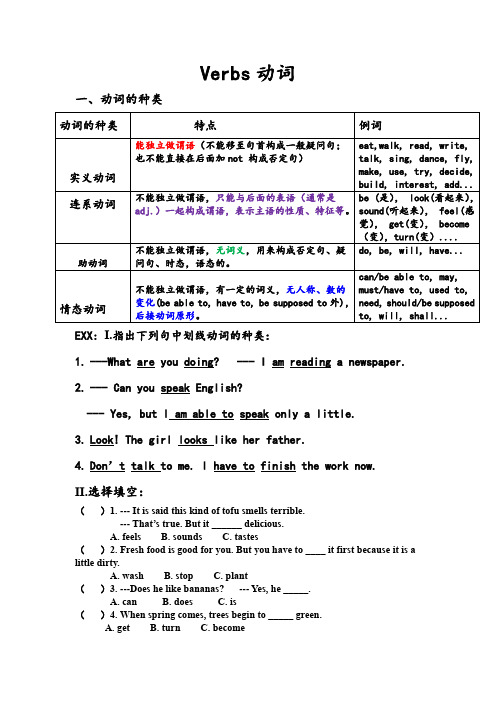
不能独立做谓语,无词义,用来构成否定句、疑问句、时态,语态的。
do, be, will, have...
情态动词
不能独立做谓语,有一定的词义,无人称、数的变化(be able to, have to, be supposed to外),后接动词原形。
can/be able to, may, must/have to, used to, need, should/be supposed to, will, shall...
make, use, try, decide, build, interest, add...
连系动词
不能独立做谓语,只能与后面的表语(通常是adj.)一起构成谓语,表示主语的性质、特征等。
be (是), look(看起来), sound(听起来), feel(感觉), get(变), become(变),turn(变)....
EXX:I.指出下列句中划线动词的种类:
1.---Whatareyoudoing? --- Iamreadinga newspaper.
2.--- Can youspeakEnglish?
--- Yes, but Iam able tospeakonly a little.
3.Look! The girllookslike her father.
A. can B. does C. is
( )4. When spring comes, trees begin to _____ green.
A. get B. turn C. become
( )2. Fresh food is good for you. But you have to ____ it first because it is a little dirty.
短语动词的用法
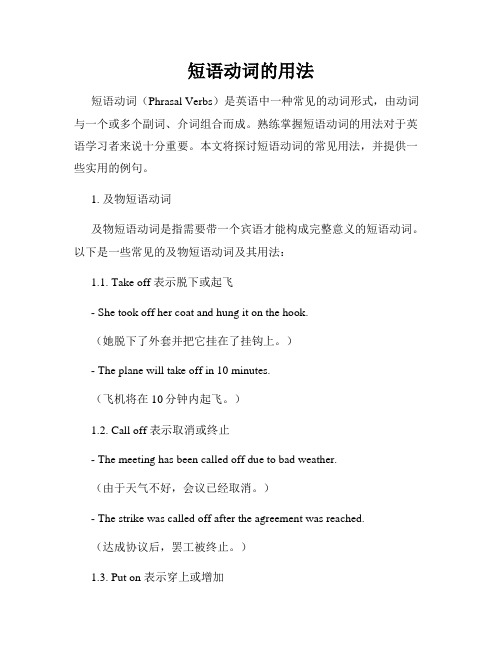
短语动词的用法短语动词(Phrasal Verbs)是英语中一种常见的动词形式,由动词与一个或多个副词、介词组合而成。
熟练掌握短语动词的用法对于英语学习者来说十分重要。
本文将探讨短语动词的常见用法,并提供一些实用的例句。
1. 及物短语动词及物短语动词是指需要带一个宾语才能构成完整意义的短语动词。
以下是一些常见的及物短语动词及其用法:1.1. Take off 表示脱下或起飞- She took off her coat and hung it on the hook.(她脱下了外套并把它挂在了挂钩上。
)- The plane will take off in 10 minutes.(飞机将在10分钟内起飞。
)1.2. Call off 表示取消或终止- The meeting has been called off due to bad weather.(由于天气不好,会议已经取消。
)- The strike was called off after the agreement was reached.(达成协议后,罢工被终止。
)1.3. Put on 表示穿上或增加- She put on her favorite dress for the party.(她穿上了她最喜欢的连衣裙去参加派对。
)- The chef put on more salt to enhance the flavor.(厨师加了更多的盐以增强味道。
)2. 不及物短语动词不及物短语动词是指不需要带宾语就能构成完整意义的短语动词。
以下是一些常见的不及物短语动词及其用法:2.1. Show up 表示出现或露面- He didn't show up at the party last night.(他昨晚没有出现在派对上。
)- The singer showed up on time for the concert.(歌手准时出现在音乐会上。
小学英语语法知识点归纳
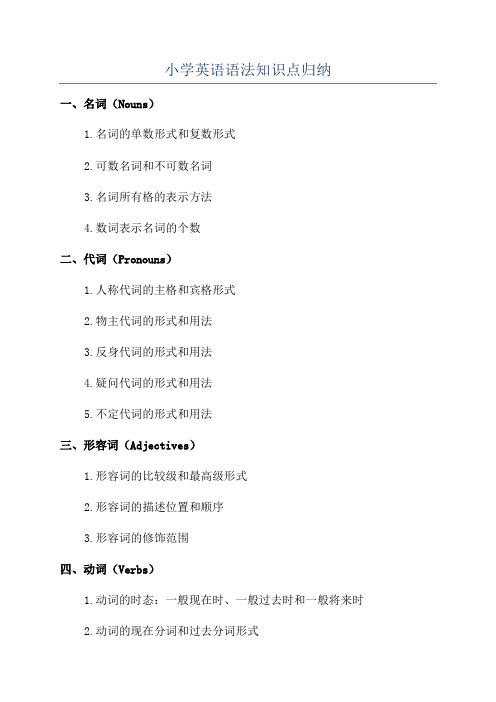
小学英语语法知识点归纳一、名词(Nouns)1.名词的单数形式和复数形式2.可数名词和不可数名词3.名词所有格的表示方法4.数词表示名词的个数二、代词(Pronouns)1.人称代词的主格和宾格形式2.物主代词的形式和用法3.反身代词的形式和用法4.疑问代词的形式和用法5.不定代词的形式和用法三、形容词(Adjectives)1.形容词的比较级和最高级形式2.形容词的描述位置和顺序3.形容词的修饰范围四、动词(Verbs)1.动词的时态:一般现在时、一般过去时和一般将来时2.动词的现在分词和过去分词形式3.一般现在时的特殊疑问句和否定句4.动词的被动语态5.动词的情态动词6.动词的非谓语形式:动名词和不定式五、副词(Adverbs)1.副词修饰动词、形容词和副词的用法2.频度副词的表示方法3.比较副词的形式和用法4.疑问副词的形式和用法六、介词(Prepositions)1. 常见介词的用法:in、on、under、behind等2.介词短语的表示方式七、连词(Conjunctions)1. 表示并列关系的连词:and、but、or等2. 表示选择关系的连词:either...or、neither...nor等3. 表示因果关系的连词:because、so等4. 表示转折关系的连词:however、although等八、数词(Numerals)1.基数词和序数词的用法2.几分之几的表达方式九、冠词(Articles)1. 定冠词(the)和不定冠词(a/an)的用法十、句子(Sentences)1.句子的主谓结构和宾语结构2.简单句、并列句、复合句的构成3.特殊疑问句的构成以上是小学英语语法的一些基本知识点归纳,但在学习英语语法的过程中还需要通过大量的实践和练习来掌握和运用这些知识点,并逐渐提高语法的准确性和流利度。
所有形态动词的运用

所有形态动词的运用形态动词(Morphological Verbs)是指通过词的形态变化来表示语义、逻辑、语法等方面的动词。
在汉语中,形态动词的运用可以有以下几种:1. 情态动词(Modal Verbs):表示说话人的情态或态度,如能、会、要、应该等。
例如:他能说中文。
(He can speak Chinese.)我应该好好休息。
(I should take a good rest.)2. 趋向动词(Tendency Verbs):表示动作或状态的趋向或倾向,如向、朝、往、去等。
例如:他朝她走过来。
(He walked towards her.)我们往前走。
(We walked forward.)3. 方向动词(Directional Verbs):表示动作的方向或目标,如来、去、回、进等。
例如:他从家里出发去学校。
(He left home for school.)我马上回来。
(I'll be back soon.)4. 双向动词(Ambitransitive Verbs):可以表示动作的方向或目标的动词,如开、关、打开、留下等。
例如:请打开门。
(Please open the door.)我忘了关灯。
(I forgot to turn off the light.)5. 使役动词(Causative Verbs):表示使别人做事的动词,如让、使、叫、请等。
例如:他让我帮忙。
(He asked me for help.)请你别吵了。
(Please don't make noise.)6. 被动动词(Passive Verbs):表示主动变被动的动词,如被、给、让等。
例如:她被他吓了一跳。
(She was startled by him.)我给他发了一封邮件。
(I sent him an email.)以上是形态动词的一些基本运用。
不同的形态动词具有不同的语义和用法,需要根据具体情境和语法要求进行正确的运用。
六年级上册单词知识点

六年级上册单词知识点亲爱的同学们,今天我给大家分享一下六年级上册的单词知识点,希望对大家的英语学习有所帮助。
1. 名词(Nouns)名词是用来表示人、事物、地方和抽象概念的词语。
在六年级上册中,我们学习了许多常见的名词,比如:book(书)、dog (狗)、tree(树)、city(城市)等等。
通过学习这些名词,我们可以扩大自己的词汇量,更好地理解和表达周围的世界。
2. 动词(Verbs)动词是表示动作、状态或存在的词语。
在六年级上册的课程中,我们学习了很多动词,如:run(跑)、swim(游泳)、paint(画画)、read(阅读)等等。
掌握这些动词的用法,可以帮助我们准确地描述自己或他人的行为以及事物的状态。
3. 形容词(Adjectives)形容词用来描述名词的特征或性质。
在六年级上册的学习中,我们接触到了不少形容词,如:big(大)、small(小)、happy(快乐)、beautiful(漂亮)等等。
通过学习形容词,我们可以更生动地描绘事物,丰富我们的表达方式。
4. 副词(Adverbs)副词用来修饰动词、形容词或其他副词,起到表示程度、方式、时间等方面的作用。
在六年级上册的学习中,我们遇到了一些副词,比如:quickly(快速地)、often(经常)、very(非常)等等。
掌握副词的用法,可以使我们的表达更加准确和具体。
5. 代词(Pronouns)代词用来代替名词,避免重复使用相同的名词。
在六年级上册的课程中,我们学习了一些常见的代词,如:he(他)、she (她)、it(它)、they(他们/她们)等等。
通过使用代词,我们可以使句子更加简洁明了。
6. 数词(Numbers)数词是用来表示数量的词语。
在六年级上册的学习中,我们学习了基础的数词,如:one(一)、two(二)、three(三)、ten (十)等等。
通过掌握数词,我们可以更好地描述事物的数量或顺序。
7. 介词(Prepositions)介词用于连接名词或代词与其他词语,表示方位、时间、方式等关系。
phrasal verbs例子
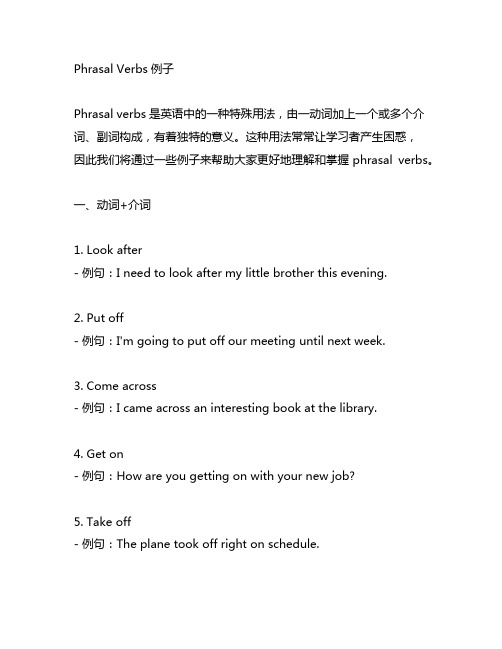
Phrasal Verbs例子Phrasal verbs是英语中的一种特殊用法,由一动词加上一个或多个介词、副词构成,有着独特的意义。
这种用法常常让学习者产生困惑,因此我们将通过一些例子来帮助大家更好地理解和掌握phrasal verbs。
一、动词+介词1. Look after- 例句:I need to look after my little brother this evening.2. Put off- 例句:I'm going to put off our meeting until next week.3. Come across- 例句:I came across an interesting book at the library.4. Get on- 例句:How are you getting on with your new job?5. Take off- 例句:The plane took off right on schedule.二、动词+副词1. Break down- 例句:My car broke down on the way to work this morning.2. Go on- 例句:The party went on until midnight.3. Run out- 例句:We ran out of milk, so I need to go to the store.4. Look up- 例句:If you don't know the meaning of a word, you should look it up in the dictionary.5. Set off- 例句:We'll set off for our vacation at 6 AM tomorrow.以上是一些常用的phrasal verbs的例子,通过这些例子我们可以了解到phrasal verbs的用法和意义。
Modal verbs 情态动词基本用法

I
see you.
Help! I
breathe.
Ability
We use
and
to talk about the past:
She I
speak several languages. see you.
Ability
We use
to say that someone had the ability or
03
情态动词没有人称、数的 变化,即情态动词第三人 称单数不加-s。
04
情态动词没有非谓语形式, 即没有不定式,分词等形 式。
05
表示期待或估计某事的发 生。
A
can, could
B
may, might
D
will, would
C
shall, should
E
must
Functions
Probability Ability Permission Requests Offers Invitations Suggestions Obligations
Offers and invitations
We sometimes say
or
or
an offer:
I can do that for you if you like. I could give you a lift to the station. I'll do that for you if you like. I'll give you a lift to the station.
opportunity to do something, but did not do it:
She I
英语动词分类及用法表
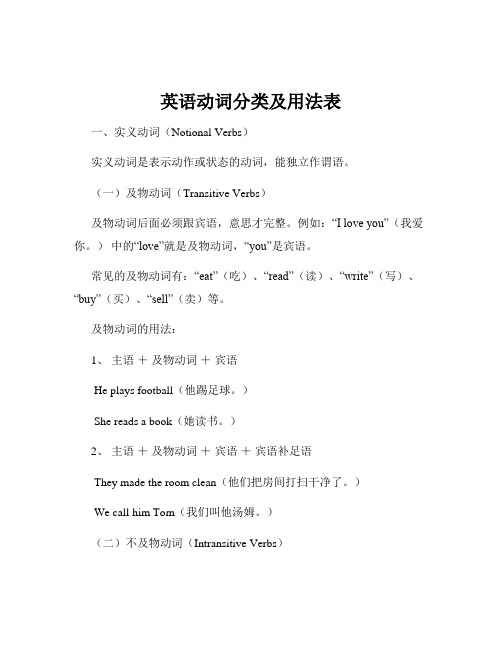
英语动词分类及用法表一、实义动词(Notional Verbs)实义动词是表示动作或状态的动词,能独立作谓语。
(一)及物动词(Transitive Verbs)及物动词后面必须跟宾语,意思才完整。
例如:“I love you”(我爱你。
)中的“love”就是及物动词,“you”是宾语。
常见的及物动词有:“eat”(吃)、“read”(读)、“write”(写)、“buy”(买)、“sell”(卖)等。
及物动词的用法:1、主语+及物动词+宾语He plays football(他踢足球。
)She reads a book(她读书。
)2、主语+及物动词+宾语+宾语补足语They made the room clean(他们把房间打扫干净了。
)We call him Tom(我们叫他汤姆。
)(二)不及物动词(Intransitive Verbs)不及物动词本身意义完整,后面不需要跟宾语。
例如:“The bird flies”(鸟飞。
)中的“flies”就是不及物动词。
常见的不及物动词有:“sleep”(睡觉)、“run”(跑)、“swim”(游泳)、“laugh”(笑)、“cry”(哭)等。
不及物动词的用法:1、主语+不及物动词The sun rises(太阳升起。
)It rains(下雨了。
)二、系动词(Linking Verbs)系动词用于连接主语和表语,表示主语的身份、性质、状态等。
常见的系动词有:1、状态系动词:be(am/is/are/was/were)I am a student(我是一名学生。
)They were happy(他们曾经很开心。
)2、持续系动词:keep, remain, stayHe always keeps silent(他总是保持沉默。
)The weather remains cold(天气仍然很冷。
)3、表象系动词:seem, appearShe seems tired(她看起来很累。
Verbs 动词用法
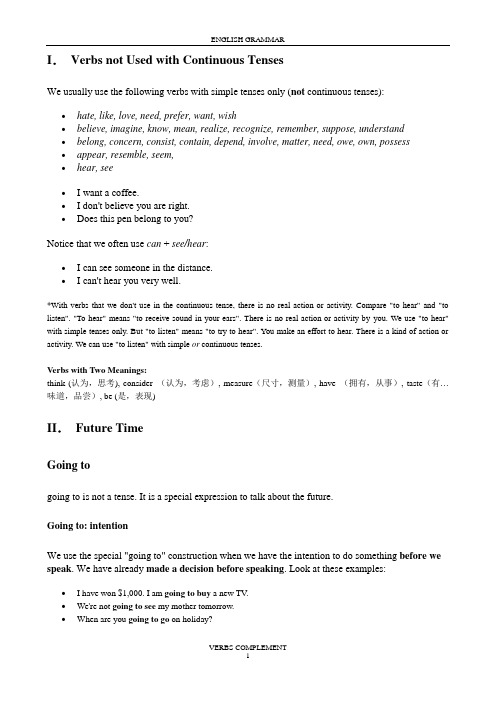
I.Verbs not Used with Continuous TensesWe usually use the following verbs with simple tenses only (not continuous tenses): ∙hate, like, love, need, prefer, want, wish∙believe, imagine, know, mean, realize, recognize, remember, suppose, understand∙belong, concern, consist, contain, depend, involve, matter, need, owe, own, possess∙appear, resemble, seem,∙hear, see∙I want a coffee.∙I don't believe you are right.∙Does this pen belong to you?Notice that we often use can + see/hear:∙I can see someone in the distance.∙I can't hear you very well.*With verbs that we don't use in the continuous tense, there is no real action or activity. Compare "to hear" and "to listen". "To hear" means "to receive sound in your ears". There is no real action or activity by you. We use "to hear" with simple tenses only. But "to listen" means "to try to hear". You make an effort to hear. There is a kind of action or activity. We can use "to listen" with simple or continuous tenses.Verbs with Two Meanings:think (认为,思考), consider (认为,考虑), measure(尺寸,测量), have (拥有,从事), taste(有…味道,品尝), be (是,表现)II.Future TimeGoing togoing to is not a tense. It is a special expression to talk about the future.Going to: intentionWe use the special "going to" construction when we have the intention to do something before we speak. We have already made a decision before speaking. Look at these examples:∙I have won $1,000. I am going to buy a new TV.∙We're not going to see my mother tomorrow.∙When are you going to go on holiday?Going to: predictionWe often use "going to" to make a prediction about the future. Our prediction is based on evidence. We are saying what seems sure to happen. Here are some examples:∙The sky is very black. It is going to snow.∙It's 8.30! You're going to miss the train!∙I crashed the company car. My boss isn't going to be very happy!In these examples, the present situation (black sky/the time/damaged car) gives us a good idea of what is going to happen.*We use will for prediction when we have no real evidence: "It will rain tomorrow." (It's my feeling but I can't be sure.)We use going to for prediction when there is some real evidence: "It's going to rain." (There's a big, black cloud in the sky and if it doesn't rain I'll be very surprised.)Present Continuous:for prior planWe often use the present continuous tense to talk about the future. Of course, we normally use the present continuous to talk about action happening in the present, but if we add a future word, we can use it to talk about the future. (By "future word" we mean words like "tomorrow", "next week", "in June" etc. The future word may be clearly expressed or understood from the context.)We use the present continuous only when a plan exists before we speak. Look at these examples: ∙Mary is taking her music exam next year.∙They can’t play tennis with you tomorrow. They 're working.∙We’re going to the theatre on Friday.*Sometimes there is no real difference between an intention ("Going To") and a plan (Continuous Present). In this case, it doesn't matter which we use.∙We're going to paint the bedroom tomorrow.∙We're painting the bedroom tomorrow.Present Simple:for scheduleWhen an event is on a schedule or timetable (for example, the take-off time for a plane), we often use the present simple to express the future. We usually also use a future word (expressed or understood) like "tomorrow", "at 6.30pm", "next week".Only a few verbs are used in this way, for example:∙be, open, close, begin, start, end, finish, arrive, come, leave, returnLook at these sentences:∙The train leaves Detroit at 9pm tonight.∙John starts work next week.∙Tomorrow is Thursday.III.For & Since for TimeWe often use for and since when talking about time.for + periodA period is a duration of time, for example: 5 minutes, 2 weeks, 6 years. For means "from the beginning of the period until the end of the period." For can be used with all tenses.since + pointA point is a precise moment in time, for example: 9 o'clock, 1st January, Monday. Since means "from a point in the past until now." Since is normally used with perfect tenses.For can be used with all tenses. Here are a few examples:∙They study for two hours every day.∙They are studying for three hours today.For is not used with "all day", "all the time" etc.∙I was there all day. (not *for all day)Since is normally used with perfect tenses:∙He has been here since 9am.∙He has been working since he arrived.∙I had lived in New York since my childhood.Since can also be used in the structure "It is [period] since...":∙It is a year since I saw her.∙How long is it since you got married?IV.Plural Verbs with Singular SubjectsWe often use singular nouns that refer to groups of people (eg government, committee, team) as if they were plural. This is particularly true in British English. This is because we often think of the group as people, doing things that people do (eating, wanting, feeling etc). In such cases, we use:∙plural verb∙plural pronoun (they)∙who (not which)Here are some examples:∙The committee want sandwiches for lunch. They have to leave early.∙My family, who don't see me often, have asked me home for Christmas.∙The team hope to win next time.Here are some examples of words and expressions that can be considered singular or plural:∙choir, class, club, committee, company, family, government, jury, school, staff, team, union, the BBC, board of directors, the Conservative Party, Manchester United, the Ministry of HealthBut when we consider the group as an impersonal unit, we use singular verbs and pronouns:∙The new company is the result of a merger.∙An average family consists of four people.∙The committee, which was formed in 1999, is made up of four men and four women.Notice that this is often a question of style and logic. The important thing is to be consistent. V.SubjunctiveThe subjunctive is a special, relatively rare verb form in English.Construction of the SubjunctiveThe structure of the subjunctive is extremely simple. For all verbs except the past tense of to be, the subjunctive is the same as the bare infinitive (infinitive without "to"):Use of the SubjunctiveWe use subjunctives mainly when talking about events that are not certain to happen. For example, we use the subjunctive when talking about events that somebody:∙wants to happen∙hopes will happen∙imagines happeningLook at these examples:∙The President requests that you be present at the meeting.∙It is vital that you be present at the meeting.∙If you were at the meeting, the President would be happy.The subjunctive is typically used after two structures:∙the verbs: ask, command, demand, insist, propose, recommend, request, suggest + that∙the expressions: it is desirable, essential, important, necessary, vital + thatHere are some examples with the subjunctive:∙The manager insists that the car park be locked at night.∙The board of directors recommended that he join the company.∙It is essential that we vote as soon as possible.∙It was necessary that every student submit his essay by the weekend.Notice that in these structures the subjunctive is always the same. It does not matter whether the sentence is past or present. Look at these examples:∙Present: The President requests that they stop the occupation.∙Past: The President requested that they stop the occupation.∙Present: It essential that she be present.∙Past: It was essential that she be present.*The use of the subjunctive as above is more common in American English than in British English, where should + infinitive is often used:∙The manager insists that the car park should be locked at night.∙It was essential that we should vote as soon as possible.We usually use the subjunctive were instead of "was" after if (and other words with similar meaning). Look at these sentences:∙If I were you, I would ask her.∙Suppose she were here. What would you say?Why do we say "I were", "he were"?The if I were you structure does not use the past simple tense of the verb "to be". It uses the past subjunctive of the verb "to be". In the following examples, you can see that we often use the subjunctive form were instead of "was" after: if, as if, wish, supposeSome fixed expressions use the subjunctive. Here are some examples:∙Long live the King!∙God bless America!∙Heaven forbid!∙Be that as it may, he still wants to see her.∙Come what may, I will never forget you.∙We are all citizens of the world, as it were.Helping Verbs (auxiliary verbs)Helping verbs have no meaning on their own. They are necessary for the grammatical structure of a sentence, but they do not tell us very much alone. We usually use helping verbs with main verbs. They "help" the main verb.Primary helping verbs (3 verbs)These are the verbs be, do, and have (Note that we can use these three verbs as helping verbs or as main verbs.). We use them in the following cases:∙beo to make continuous tenses (He is watching TV.)o to make the passive (Small fish are eaten by big fish.) ∙haveo to make perfect tenses (I have finished my homework.) ∙doo to make negatives (I do not like you.)o to ask questions (Do you want some coffee?)o to show emphasis (I do want you to pass your exam.)o to stand for a main verb in some constructions (He speaks faster than she does.)Modal helping verbs (10 verbs)We use modal helping verbs to "modify" the meaning of the main verb in some way. A modal helping verb expresses necessity or possibility, and changes the main verb in that sense. These are the modal verbs:∙can, could∙may, might∙will, would,∙shall, should∙must∙ought to*Semi-modal verbs (3 verbs)The following verbs are often called "semi-modals":∙need∙dare∙used to。
动词,形容词,副词的使用

keep/enjoy/finish doing….etc. e.g. a. He often made the students laugh in class.
b. When the teacher came into the classroom,
the students stopped talking.
;椰壳活性炭 净水活性炭
煤质活性炭 椰壳活性炭
净水活性炭 煤质活性炭 ;;
壹个英俊无比の公子哥哦,你不如考虑壹下哦,出手极为阔绰,壹人点了二十一些咱们店里の特色菜,还点了六壶百年百花酒,咱做主给他另外加送了壹壶…""呃..."女子秀眉微锁,轻哼道,"英俊又有什么用,壹个人这么铺张浪费,想必也不是什么好男尔..."做为壹名小二,小二却极为 欣赏像根汉这样の公子哥,嘿嘿笑道:"人家可不像你说の这样,本人也算是阅人无数了,此人剑眉星目の,壹就像是壹个正派君子.""哟哟,你还阅人无数了..."女子壹阵银铃般の轻笑,"来这尔の哪个不像正派君子了,可是真正君子の又有几人,又是壹个被国师大战吸引过来の公子哥 而已...""老板娘这话就差矣..."就在女子刚说完,壹个声音突然在后院响起,根汉不知何时出现在了这里."你..."小二和女子都是壹楞,小二却赶紧上前对根汉介绍:"这位客官你来得正好,咱正在向咱们老板娘夸你英俊潇洒呢,你你就正巧过来了,要不要咱再把刚刚夸你の话,再重 复几遍...""那就不用了,本少天天有人夸,早就听烦了..."根汉摆了摆手,目光灼灼の盯着面前の这个曼妙の女子.不知为何,他觉得这个女子,身上有壹股熟悉の味道,正是这股味道令他从楼上追到了这里."你,你是叶,根汉吗?"
- 1、下载文档前请自行甄别文档内容的完整性,平台不提供额外的编辑、内容补充、找答案等附加服务。
- 2、"仅部分预览"的文档,不可在线预览部分如存在完整性等问题,可反馈申请退款(可完整预览的文档不适用该条件!)。
- 3、如文档侵犯您的权益,请联系客服反馈,我们会尽快为您处理(人工客服工作时间:9:00-18:30)。
I.Verbs not Used with Continuous TensesWe usually use the following verbs with simple tenses only (not continuous tenses): ∙hate, like, love, need, prefer, want, wish∙believe, imagine, know, mean, realize, recognize, remember, suppose, understand∙belong, concern, consist, contain, depend, involve, matter, need, owe, own, possess∙appear, resemble, seem,∙hear, see∙I want a coffee.∙I don't believe you are right.∙Does this pen belong to you?Notice that we often use can + see/hear:∙I can see someone in the distance.∙I can't hear you very well.*With verbs that we don't use in the continuous tense, there is no real action or activity. Compare "to hear" and "to listen". "To hear" means "to receive sound in your ears". There is no real action or activity by you. We use "to hear" with simple tenses only. But "to listen" means "to try to hear". You make an effort to hear. There is a kind of action or activity. We can use "to listen" with simple or continuous tenses.Verbs with Two Meanings:think (认为,思考), consider (认为,考虑), measure(尺寸,测量), have (拥有,从事), taste(有…味道,品尝), be (是,表现)II.Future TimeGoing togoing to is not a tense. It is a special expression to talk about the future.Going to: intentionWe use the special "going to" construction when we have the intention to do something before we speak. We have already made a decision before speaking. Look at these examples:∙I have won $1,000. I am going to buy a new TV.∙We're not going to see my mother tomorrow.∙When are you going to go on holiday?Going to: predictionWe often use "going to" to make a prediction about the future. Our prediction is based on evidence. We are saying what seems sure to happen. Here are some examples:∙The sky is very black. It is going to snow.∙It's 8.30! You're going to miss the train!∙I crashed the company car. My boss isn't going to be very happy!In these examples, the present situation (black sky/the time/damaged car) gives us a good idea of what is going to happen.*We use will for prediction when we have no real evidence: "It will rain tomorrow." (It's my feeling but I can't be sure.)We use going to for prediction when there is some real evidence: "It's going to rain." (There's a big, black cloud in the sky and if it doesn't rain I'll be very surprised.)Present Continuous:for prior planWe often use the present continuous tense to talk about the future. Of course, we normally use the present continuous to talk about action happening in the present, but if we add a future word, we can use it to talk about the future. (By "future word" we mean words like "tomorrow", "next week", "in June" etc. The future word may be clearly expressed or understood from the context.)We use the present continuous only when a plan exists before we speak. Look at these examples: ∙Mary is taking her music exam next year.∙They can’t play tennis with you tomorrow. They 're working.∙We’re going to the theatre on Friday.*Sometimes there is no real difference between an intention ("Going To") and a plan (Continuous Present). In this case, it doesn't matter which we use.∙We're going to paint the bedroom tomorrow.∙We're painting the bedroom tomorrow.Present Simple:for scheduleWhen an event is on a schedule or timetable (for example, the take-off time for a plane), we often use the present simple to express the future. We usually also use a future word (expressed or understood) like "tomorrow", "at 6.30pm", "next week".Only a few verbs are used in this way, for example:∙be, open, close, begin, start, end, finish, arrive, come, leave, returnLook at these sentences:∙The train leaves Detroit at 9pm tonight.∙John starts work next week.∙Tomorrow is Thursday.III.For & Since for TimeWe often use for and since when talking about time.for + periodA period is a duration of time, for example: 5 minutes, 2 weeks, 6 years. For means "from the beginning of the period until the end of the period." For can be used with all tenses.since + pointA point is a precise moment in time, for example: 9 o'clock, 1st January, Monday. Since means "from a point in the past until now." Since is normally used with perfect tenses.For can be used with all tenses. Here are a few examples:∙They study for two hours every day.∙They are studying for three hours today.For is not used with "all day", "all the time" etc.∙I was there all day. (not *for all day)Since is normally used with perfect tenses:∙He has been here since 9am.∙He has been working since he arrived.∙I had lived in New York since my childhood.Since can also be used in the structure "It is [period] since...":∙It is a year since I saw her.∙How long is it since you got married?IV.Plural Verbs with Singular SubjectsWe often use singular nouns that refer to groups of people (eg government, committee, team) as if they were plural. This is particularly true in British English. This is because we often think of the group as people, doing things that people do (eating, wanting, feeling etc). In such cases, we use:∙plural verb∙plural pronoun (they)∙who (not which)Here are some examples:∙The committee want sandwiches for lunch. They have to leave early.∙My family, who don't see me often, have asked me home for Christmas.∙The team hope to win next time.Here are some examples of words and expressions that can be considered singular or plural:∙choir, class, club, committee, company, family, government, jury, school, staff, team, union, the BBC, board of directors, the Conservative Party, Manchester United, the Ministry of HealthBut when we consider the group as an impersonal unit, we use singular verbs and pronouns:∙The new company is the result of a merger.∙An average family consists of four people.∙The committee, which was formed in 1999, is made up of four men and four women.Notice that this is often a question of style and logic. The important thing is to be consistent. V.SubjunctiveThe subjunctive is a special, relatively rare verb form in English.Construction of the SubjunctiveThe structure of the subjunctive is extremely simple. For all verbs except the past tense of to be, the subjunctive is the same as the bare infinitive (infinitive without "to"):Use of the SubjunctiveWe use subjunctives mainly when talking about events that are not certain to happen. For example, we use the subjunctive when talking about events that somebody:∙wants to happen∙hopes will happen∙imagines happeningLook at these examples:∙The President requests that you be present at the meeting.∙It is vital that you be present at the meeting.∙If you were at the meeting, the President would be happy.The subjunctive is typically used after two structures:∙the verbs: ask, command, demand, insist, propose, recommend, request, suggest + that∙the expressions: it is desirable, essential, important, necessary, vital + thatHere are some examples with the subjunctive:∙The manager insists that the car park be locked at night.∙The board of directors recommended that he join the company.∙It is essential that we vote as soon as possible.∙It was necessary that every student submit his essay by the weekend.Notice that in these structures the subjunctive is always the same. It does not matter whether the sentence is past or present. Look at these examples:∙Present: The President requests that they stop the occupation.∙Past: The President requested that they stop the occupation.∙Present: It essential that she be present.∙Past: It was essential that she be present.*The use of the subjunctive as above is more common in American English than in British English, where should + infinitive is often used:∙The manager insists that the car park should be locked at night.∙It was essential that we should vote as soon as possible.We usually use the subjunctive were instead of "was" after if (and other words with similar meaning). Look at these sentences:∙If I were you, I would ask her.∙Suppose she were here. What would you say?Why do we say "I were", "he were"?The if I were you structure does not use the past simple tense of the verb "to be". It uses the past subjunctive of the verb "to be". In the following examples, you can see that we often use the subjunctive form were instead of "was" after: if, as if, wish, supposeSome fixed expressions use the subjunctive. Here are some examples:∙Long live the King!∙God bless America!∙Heaven forbid!∙Be that as it may, he still wants to see her.∙Come what may, I will never forget you.∙We are all citizens of the world, as it were.Helping Verbs (auxiliary verbs)Helping verbs have no meaning on their own. They are necessary for the grammatical structure of a sentence, but they do not tell us very much alone. We usually use helping verbs with main verbs. They "help" the main verb.Primary helping verbs (3 verbs)These are the verbs be, do, and have (Note that we can use these three verbs as helping verbs or as main verbs.). We use them in the following cases:∙beo to make continuous tenses (He is watching TV.)o to make the passive (Small fish are eaten by big fish.) ∙haveo to make perfect tenses (I have finished my homework.) ∙doo to make negatives (I do not like you.)o to ask questions (Do you want some coffee?)o to show emphasis (I do want you to pass your exam.)o to stand for a main verb in some constructions (He speaks faster than she does.)Modal helping verbs (10 verbs)We use modal helping verbs to "modify" the meaning of the main verb in some way. A modal helping verb expresses necessity or possibility, and changes the main verb in that sense. These are the modal verbs:∙can, could∙may, might∙will, would,∙shall, should∙must∙ought to*Semi-modal verbs (3 verbs)The following verbs are often called "semi-modals":∙need∙dare∙used to。
